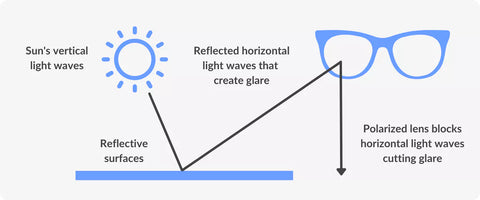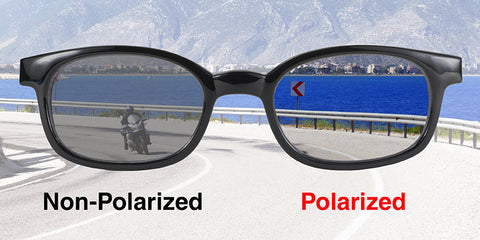In the realm of eyewear, polarized glasses have gained significant popularity for their unique functionality and benefits. Whether you're an avid outdoor enthusiast, a regular commuter, or simply someone who values clear vision, understanding polarized glasses can greatly enhance your appreciation of their purpose and advantages.
What Are Polarized Glasses?
Polarized glasses are specially designed eyewear that reduces glare from surfaces such as water, snow, and glass. This glare is typically caused by sunlight that is reflected off these surfaces in a horizontal direction, leading to discomfort and reduced visibility. Polarized lenses contain a special filter that blocks this intense reflected light, allowing only vertical light to pass through.
How Do They Work?
The key technology behind polarized glasses involves a chemical film applied to the lenses. This film contains molecules that are aligned in such a way that they only allow vertically polarized light to pass through, while horizontally polarized light is blocked. As a result, glare from horizontal surfaces is significantly reduced, providing clearer vision and enhanced comfort.

Benefits of Polarized Glasses
- Reduced Glare: The most notable benefit of polarized glasses is their ability to cut through glare from surfaces like water, snow, and roads. This reduction in glare improves visibility and reduces eye strain, especially in bright sunlight or reflective environments.
- Improved Contrast and Clarity: By eliminating glare, polarized glasses enhance contrast and clarity of vision. This is particularly advantageous for activities such as driving, fishing, skiing, and boating, where clear vision is crucial for safety and performance.
- Better Eye Comfort: Polarized lenses not only enhance visual clarity but also provide greater comfort by reducing eye fatigue and strain. This makes them ideal for long hours of outdoor activities or driving.
- UV Protection: Many polarized glasses also come with built-in UV protection, shielding your eyes from harmful UV rays. This dual benefit of glare reduction and UV protection makes polarized glasses a practical choice for maintaining eye health.
Disadvantages of Polarized Glasses
- Higher cost: Polarized lenses are more expensive than regular lenses, which is a result of their manufacturing technology and special features.
- Changes in vision at certain angles: Polarized lenses are designed to reduce reflections and glare, but sometimes at certain angles or under certain conditions, visual changes may occur, such as distortion on some LCD screens.
- Not suitable for all situations: Polarized lenses are mainly used to reduce glare on highly reflective surfaces such as water and snow, but they are not suitable for all activities and environments. In low-light conditions, such as driving at night, they may not be as effective as regular lenses.
- Impact on electronic screens: Polarized lenses may sometimes affect the viewing experience of electronic device screens, especially LCD screens (such as car dashboards or mobile phone screens), which may cause some interference or difficulty in reading.
- Not suitable for everyone: Some people may feel uncomfortable or uncomfortable with the polarization effect, and it may take some time to get used to it.
What’s The Difference Between Polarized and Non-Polarized Lenses?
Light typically travels in waves that vibrate in various directions. However, when light reflects off surfaces like snow, water, or car roofs, it often vibrates predominantly in a single horizontal direction, a phenomenon known as polarization.
This polarized light becomes concentrated and creates what we perceive as glare when it reaches our eyes. Polarized lenses are specifically designed to reduce this glare by filtering out horizontally polarized light, thereby enhancing visual clarity and comfort in bright conditions.
On the other hand, non-polarized lenses do not have this specialized filter, allowing both horizontally and vertically polarized light to enter the eye without discrimination. This results in less effective glare reduction compared to polarized lenses.

When to Wear Polarized Glasses?
Polarized glasses are highly recommended for various outdoor activities:
- Water Sports: Fishing, boating, and surfing benefit greatly from reduced water glare.
- Winter Sports: Skiing and snowboarding benefit from glare reduction on snowy surfaces.
- Driving: Polarized glasses enhance visibility and reduce glare from the road and other vehicles.
In conclusion, polarized glasses offer a combination of glare reduction, enhanced clarity, and eye protection that make them indispensable for outdoor enthusiasts and everyday users alike. Understanding their technology and benefits can help you make an informed decision when selecting eyewear that suits your lifestyle and vision needs.
Whether you're enjoying a sunny day by the water, navigating snowy slopes, or simply driving to work, polarized glasses can significantly improve your visual experience and overall comfort. Invest in a pair today to see the world more clearly while safeguarding your eyes against glare and UV rays.





